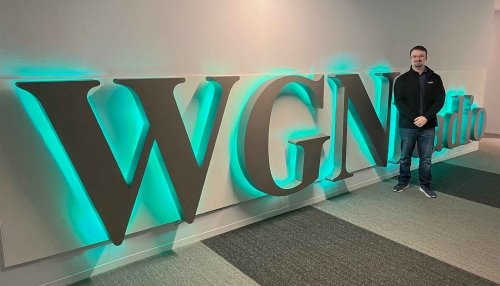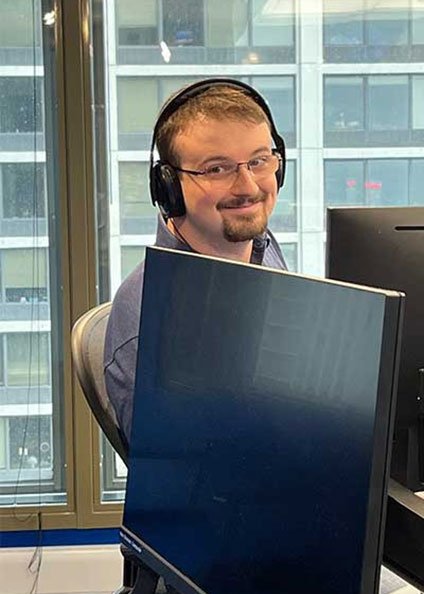Optometry Student Interviews with WGN Sharing Safety Tips for the Solar Eclipse
Student offers expert advice for radio audience
- IL - Downers Grove

Roman Somogy (CCO ’25) was interviewed on John Williams’ WGN Radio 720 show about the solar eclipse.
In view of the upcoming solar eclipse on April 8, 2024, Chicago College of Optometry student Roman Somogy (CCO ’25) shed light on eye safety. During his interview with WGN Radio 720 on April 3, 2024, Roman shared the knowledge he acquired from his Midwestern University education and provided information on best practices as the public prepares to see the eclipse.
“My experience with WGN Radio was incredibly positive and supportive, far surpassing my expectations for such a significant personal milestone. From the moment I was invited, the team at WGN treated me so well, clearly excited about the topic of safe solar eclipse viewing. Their welcoming approach and encouragement played a crucial role in making me feel comfortable and valued as an expert guest, even though I am still a student,” Roman said.
While sharing information with WGN Radio about the upcoming eclipse, Roman said that on a regular sunny day people do not normally look at the sun for more than a few seconds, as our eyes are not equipped to take in that light without burning, like an ant under a magnifying glass. The same idea applies for the eclipse. In order to view the eclipse, people would need to use safe solar glasses and filters that follow the international standard ISO 12312-2 (also listed as ISO 12312-2:2015), he specified. Roman also mentioned building a pinhole projector following online Google instructions. Still, a person can remove their glasses and view the eclipse only during the time of 100 percent totality, when the moon completely obstructs the sun, Roman added. When a person is wearing the appropriate glasses and sees beads, Baily’s beads, prior to the eclipse, then that indicates the eclipse is imminent.

However, the majority of the country is only seeing a partial eclipse, and it is unsafe to view without the appropriate eyewear, Roman emphasized. A person can run the risk of solar retinopathy, which Roman described as similar to the eye tissue receiving a sunburn. The concern on the day of the eclipse is the potential damage to central vision, which is necessary to view faces and read, Roman said. He compared the possible damage to a scale, dependent upon the amount of exposure, and said indications could begin with blurry or decreased vision and escalating to black spots and vision distortions.
Roman encouraged people to implement the necessary precautions and take the opportunity to view the eclipse. He also urged caution and proper supervision for children and special populations. Roman also reminded listeners that the U.S. will have another eclipse in 2044, and Illinois will be in the path of the solar eclipse in 2099.
Midwestern University offers a Doctor of Optometry (O.D.) degree program on both the Downers Grove, IL, and Glendale, AZ campuses. Roman shared that his education at Midwestern University prepared him to be in the role of an expert during a public interview. “The optometry program places a strong emphasis on the patient-doctor relationship, focusing on the ability to communicate complex eye health concepts in an understandable way. This is practiced in every clinical encounter, where we learn to engage with patients effectively, making sure they are informed and comfortable with their care.” He added, “A dedicated part of our curriculum in the third year focuses exclusively on patient education, requiring us to demonstrate our ability to explain a broad spectrum of conditions and treatments clearly. The supportive and hands-on learning environment at Midwestern University has been instrumental in preparing me for such significant opportunities, enabling me to share important health information with the public confidently. This ability to communicate complex eye health concepts in an accessible manner is a skill I plan to utilize throughout my career.”
Listen to Roman’s interview with WGN Radio’s John Williams.



